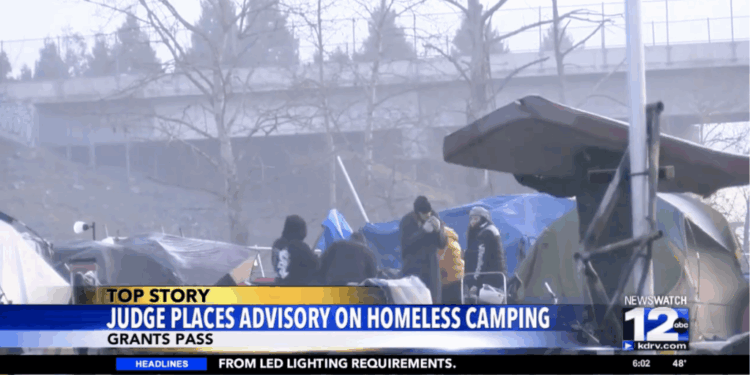More than a year after the Supreme Court’s ruling upholding local rules banning homeless camps on public property, Grants Pass is still a mess. The southeast Oregon city is also Exhibit A of what Christopher Rufo calls the homelessness industrial complex.
Grants Pass won. In 2024, the Supreme Court struck down lower court decisions and held that laws regulating camping on public land do not violate the Eighth Amendment’s protection against cruel and unusual punishment. The ruling was a win for local control.
The win was short-lived.
Homeless “advocates” in late January filed a lawsuit claiming the southwest Oregon city of 40,000 residents had violated state law that requires local laws “regulating sitting, lying, sleeping or keeping warm and dry outdoors on public property that is open to public must be objectively reasonable as to time, place and manner with regards to persons experiencing homelessness.” Just what “objectively reasonable” is has yet to be defined.
In August, the overwhelmed city signed a settlement requiring it to provide 150 camping spaces compliant with the Americans with Disabilities Act, and drinking water for its outdoor “guests.”
Grants Pass resident Kate Huckert in June told Oregon Public Broadcasting that she had spent $10,000 on security upgrades for her home, which stands across the street from the homeless camps.
“This is threatening to break our whole neighborhood,” she said. “It was a massive uptick in crime … It’s so scary.”
‘Garden Variety Leftie Loonies’
A veritable army of nonprofit groups and their lawyers ostensibly representing the homeless made Grants Pass the hill to die on in the pitched battle over homelessness policy.
“The scale of this engagement was striking, but so was its character: organizations the public often imagines handing out meals or running shelters were instead investing in a highly technical legal process before the Supreme Court,” a new report from nonprofit tracker Capital Research Center in cooperation with the Discovery Institute states.
“Infiltrated: The Ideological Capture of Homeless Advocacy” explores the “incongruity” of the Grants Pass case, which underscores how the charitable sector as a whole — far beyond any single group — “increasingly devotes substantial resources to political advocacy, and how these organizations — and sometimes these very efforts — are often underwritten by taxpayer-funded grants.”
Leftist political advocacy.
The report tracks the industrial homelessness complex that, in many cases, has used advocacy for the homeless as a front for all kinds of radical causes. It’s a multibillion-dollar industry that seems to benefit every liberal interest group at the expense of the people it’s supposed to be serving.
Researchers tracked hundreds of advocacy groups supposedly committed to helping the homeless. The vast majority of the nonprofits are designated as 501(c)(3) charities prohibited from engaging in partisan political activity and limited in how much they can lobby. More than 700 nonprofits signed onto amicus briefs in the Supreme Court case arguing against Grants Pass and — U.S. cities like it — from stopping the takeover of sections of their communities by severely mentally ill transients, drug addicts and violent criminals.
“Groups such as the Southern Poverty Law Center, the National Homelessness Law Center, the Western Regional Advocacy Project, and the National Low Income Housing Coalition position themselves as defenders of civil rights, yet their work increasingly detaches from the concrete needs of people living on the streets,” the report asserts.
“Rather than delivering services to the needy, many of these organizations devote their resources to litigation, lobbying, and ideological campaigns that expand their own power while leaving the wretched conditions in homeless encampments unchanged — or worse.”
The leftist coalitions in this network are devoting their time to everything from expanding abortion laws to standing in solidarity with the pro-Hamas “Free Palestine” movement.
The far-left Southern Poverty Law Center (SPLC) serves as an anti-Republican/conservative attack machine. Last month, the Center to Advance Security in America (CASA) filed a complaint asking the IRS to investigate and consider revoking the hyper-partisan SPLC’s tax-exempt status, as The Federalist reported.
Scott Walter, president of Capital Research Center, said Western Regional Advocacy Project, or WRAP, is “no gift.” The coalition of leftist groups consistently frame law enforcement as a structural enemy of “housing justice.” Western leads a national campaign against what it likes to call the “criminalization of poverty.”
“These are your garden variety loony lefties,” Walter said in a recent edition of The Federalist Radio Hour podcast. “They hate police, they push for the abolishment of police.”
Paid to ‘Exploit the Homeless’
Guess who’s helping finance the coalition’s efforts? Taxpayers, of course. Capital Research Center’s review of 990 tax forms shows that in 2023 alone, a majority of the 700-plus nonprofits that weighed in on the Grants Pass case received a combined $2.9 billion in government grants. Government generosity — via the taxpayer — made up about one-third of the groups’ total reported revenues.
Many of the organizations receive funding from ideologically aligned foundations and donor-advised fund networks, the report notes. The Tides Nexus, the leftist cause-funding giant, writes a lot of checks. Contributions pay for “coordinated anti-sweep campaigns across cities, tying housing to anti-capitalist critiques in publications like Street Spirit, which labels U.S. governance ‘neoliberal fascism.’” the report states.
“In fact, the nonprofit glorifies violence targeting law enforcement and is a state-level endorser of the Housing Justice platform,” the report states.
WRAP runs with organizations that idolize cop killer Assata Shakur, praising her among the “women of the resistance” and “potent model as an activist willing to risk her life and freedom for the liberation of oppressed peoples.” Shakur, whose real name was Joanne Deborah Chesimard, died last month in that symbol of freedom and liberation, Communist Cuba, where she had resided for more than 40 years after escaping from a U.S. federal prison.
The radical leftists housed in these advocacy networks have enlisted the homeless to fill out their ranks in anti-Trump protests and riots. As a soldier in Students for a Democratic Society put it, “The issue is never the issue … The issue is the revolution.”
“So it could be Covid or George Floyd or Michael Brown or homelessness or ICE, it doesn’t matter. Just get people in the streets,” Walter said. “They are happy to exploit the homeless in all of those places.”
The ‘Housing First’ Scam
As “Infiltrated” notes, the so-called Housing Justice movement grew out of the broader “Housing First” policy. Its disciples, according to the Discovery Institute, believe that homelessness is fundamentally a housing issue, and that the solution is building more dwellings. Housing First insists that if there were a ready stock of taxpayer-funded housing, the newly homed would be in a better position to focus on treatment for mental illness and drug addiction, problems endemic in homelessness.
The movement sees “housing justice” as a building block for racial justice and liberation, leftist nonprofit Funders Together for Housing Justice asserts.
Housing First policies have pumped billions of dollars into the philosophy, but the Discovery Institute’s FixHomelessness. org shows the initiatives have failed in large part to reduce homelessness. They may even make he problem worse.
States have caught on to the scam. In 2023, Florida implemented a law barring state funds for the homeless to go to Housing First initiatives, citing “persistently high levels of unsheltered homelessness despite major investments.” Utah’s legislature passed a bill prioritizing programs with treatment programs. And Georgia policy now emphasizes transitional housing, linking funding to measurable reductions in street homelessness.
President Trump earlier this year signed an executive order aimed at dealing with the root causes of homelessness. The EO calls for the return of civil commitments when appropriate and reviewing federal grant funds to ensure they are going to effective programs that truly deal with homelessness.
“Shifting homeless individuals into long-term institutional settings for humane treatment through the appropriate use of civil commitment will restore public order,” the order states. “Surrendering our cities and citizens to disorder and fear is neither compassionate to the homeless nor other citizens. My Administration will take a new approach focused on protecting public safety.
But the homelessness industrial complex marches on, often to the detriment of the approximately 800,000 homeless in America, according to the report.
Walter said the radical left sees the homeless as “especially valuable” because the cornerstone of radicalism is to show that the United States of America is a “horrible country.”
“They want to show that chaos, disorder and suffering as alleged evidence for the awfulness of America,” the nonprofit watchdog said.
More than a year after the Supreme Court sided with local governments working to help the homeless while checking the growth of the tent cities, Grants Pass underscores the fallout of failed public policy, Walter said. And the people of the Oregon community, like in so many cities in America, are paying the price.
Mike Servant, Kate Huckert’s boyfriend, told Oregon Public Broadcasting the ordeal in Grants Pass has changed him.
“I’m a bleeding heart liberal, from way back,” he said. “This has made me harden my heart a lot. […] I’m much more callous about them, and I don’t like that.”
Matt Kittle is a senior elections correspondent for The Federalist. An award-winning investigative reporter and 30-year veteran of print, broadcast, and online journalism, Kittle previously served as the executive director of Empower Wisconsin.

















